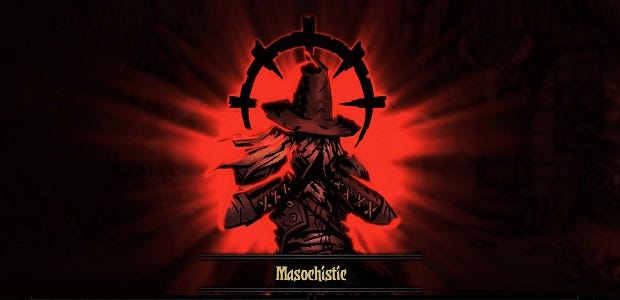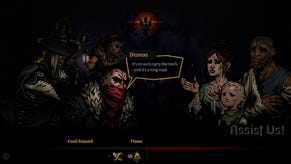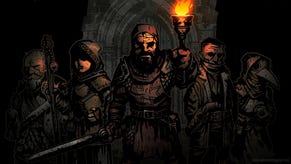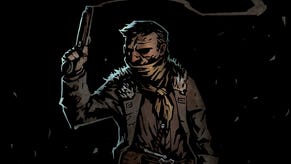How Darkest Dungeon Drove Me To Despair
Wrought low, and driven into the mud!
People have called me a maniac for my gaming habits, but they know nothing. When I discover something new it becomes – for a day, a week, maybe months – an obsession that devours time. It helps to be a freelancer of course but it always happened anyway: when Resident Evil 4 came out I used to walk home in my lunch hour just to get 20 minutes in. When Darkest Dungeon [official site] was released I couldn't get enough but, over many hours, it has gradually driven me away – in a manner so fitting it must have been intended.
Darkest Dungeon is a roguelike dungeon-crawler where you build up a barracks of troops and, over missions, they level up and become more effective. The idea is that, as you loot dungeons, you're also building up your town hamlet and a considerable fighting force to face the game's greatest challenges. The nasty flipside to this being our old friend Dr Permadeath.
The most unusual feature of Darkest Dungeon, and what intoxicated me about it at first, is the stress system: as your party explores creepy deathtraps and fights horrific nasties, each member's stress levels increase. When it hits 100 their resolve is tested, which usually results in their tiny mind cracking and the emergence of an undesirable quality – maybe they'll start berating their teammates, increasing stress levels further, or go masochist and start wounding themselves. In short, you never want them to go mad.
But the game makes this inevitable: of course it does. The stress system is designed so that it starts in the background of each mission, slowly ticking up, before you notice about two thirds of the way through that your characters' meters are looking very high. There are exceptions, but generally it's something that bites in the latter half of quests – when you've got something to lose.
What I initially admired about this system is how it loosely parallels what's going on in the player's mind. What madness does, in terms of how Darkest Dungeon works, is two things: increases the chances that another member of the party will have their resolve tested, and takes away control from the player. It makes things more difficult, and it frustrates you.
The increased pressure on your party therefore finds an echo in the player. As the stress meter rises towards 100 you get anxious about it, trying to stress heal that character and prioritising stress-dealing enemies even more than usual. When they break anyway, as they eventually do, it's almost a relief for a few seconds – your faint hope of a positive resolve test still shining – and then when they go mad it increases your own stress.
I know my chances of escaping this dungeon laden with loot have just decreased. I know my characters are now in greater danger, and if I push on things will get worse. Every turn in battle brings a little knot of fear, as I wonder whether they'll follow orders or give in to their own baser natures. I probably look serene at these moments, quietly contemplating the dungeons' amber glow, but inside it's a hurricane.
Whether this is an intended effect or not is beside the point: it's ingenious. I continued to play Darkest Dungeon, pleased with myself for noticing this, but as I became more familiar with its tricks other feelings began to coalesce around the parallel.
Prime among them was a creeping sense that at this game's heart lies a flaw, something that had come to dominate each session more and more. Part of why Darkest Dungeon's design is so great is that it's full of snowball effects – stress leads to more stress, afflictions build up over time and render characters weaker, and failed or abandoned quests waste precious resources you can never afford to fritter away.
Another of these snowball effects is losing heroes and what you have to do to rebuild your forces. You can't 'fail' a playthrough of Darkest Dungeon, but you can easily reach a point where you have a decent hamlet but have to grind out early quests to level-up new heroes, which feels suspiciously like starting over. At first I thought this was a minor problem because, after all, avoiding it is in your hands.
But now, my mind calloused by dozens of hours and heroes lost, I think different. What ended up happening, several times, was that the small snowball effects turned into something much larger. On one occasion I pushed too far in reaching the Drowned Crew with high-level heroes, a boss I'd already bested at lower levels, and underestimating its key attack. That attack pulls one of your heroes forwards each turn, immobilises them, and causes tonnes of stress.
I'd previously beaten this boss through brute force on the immobilising enemy of the Crew, but this time around my Veterans were already stressed going in – and inexplicably failed to connect the important blows. My Bounty Hunter went mad on the second turn, and became abusive. Each subsequent turn he ground down the team with petty insults: “Hmph. A child could do better.”
But what really did for me was a hesitation, and then an inability, to retreat. I stuck around just to see if I had a glimmer of hope, but the Drowned Crew kept immobilising party members – and I couldn't retreat unless they were freed, or they'd be left for dead. I finally freed one, the next turn fell to the Bounty Hunter... and he refused to take orders. Back to the Drowned Crew and another immobilised hero: over the next few turns two other heroes went mad, as I wavered between running and wanting to have everyone escape.
It was panic stations. I couldn't leave my best heroes behind to die, I couldn't make the hits to free them, and everyone was going nuts – the Vestal masochistic, the Grave Robber hopeless. They'd refuse to act on turns, reducing my chances further. In the end they died slowly, and anything but gently, over multiple turns. If I'd fled earlier then three may have lived but in the end I was left with two alive, one imprisoned, and no choice but to retreat. The Vestal stopped rending her own flesh for a moment, listened to me, and made it out.
This kind of scenario is why Darkest Dungeon is great. It's a seriously tough challenge, and the unpredictability of the stress mechanics is at its best when they interfere at crisis moments. Losing control at the exact time you must not lose control is intense – escaping with flesh wounds is such a relief, and when the above happens it's just terrible.
The fact you feel the loss so deeply is a testament to the game's developers. The truth is I hadn't been doing too well outside of that incident anyway. I'd lost a previous squad of veterans in an ill-fated attempt to pwn something huge and Eldtrich, and so including my crazy Vestal I had three level 5 heroes left. That's not enough for a party, and so I faced having to grind up my level 3s before I could have another go, and starting the long road with a fresh group of level 0s.
To enjoy Darkest Dungeon, and games like it, you must make a compact with RNGesus. You accept that He will provide you with both the greatest and worst of moments, and that part of your strategy – only a small part – will now come down to chance. It's a great trade-off for the most part. Despite all of this it is still possible to acknowledge that He's a particular asshole when it comes to games with permadeath.
There are games that suit 'grind,' but Darkest Dungeon isn't one of them – even though it's a roguelike, the dungeon layouts are by far the weakest part of the game and have far too much uneventful backtracking. When you have to grind heroes back up through the levels, minor irritants like this seem to transform – a madman's vision perhaps – into major flaws. This specific failing makes the permadeath sting even more traumatic.
If you screw up in Darkest Dungeons, and I hold my hands up and admit to this, the design is that you have to waste time. In this context, it's what grinding means. For bad decisions made in an instant, I now had to re-invest hours in earlygame dungeons to regain the strength my forces once had. On top of this, the best way to bolster your gold when you've hit bottom is to send a party of four level 0 heroes out, paying no attention to whether they live or die, leave with as much loot as possible and dismiss the survivors.
That's strange, isn't it. Permadeath has the unintended consequence of making low-level heroes cannon fodder, in a mechanical sense, and yet they go mad even more frequently than your 'real' heroes – because you're not taking care of them. The process ends up numbing the game's core appeal. What I had once found so appealing about Darkest Dungeon, the way that fear and paranoia could almost bleed out of the characters into your playstyle, was now in danger of becoming routine.
My love for those veterans, each carefully levelled up and specced-out with favourite skills, soon became scorn for those that were supposed to – eventually – take their place. I found myself playing lackadaisically, bored at grinding low level dungeons, and through this lack of care losing heroes that I'd levelled up partway. Frustration turned to anger and, as my mistakes multiplied and the graveyard began to bulge, that anger's familiarity turned to contempt.
I've sunk ample time into Darkest Dungeon, and it's a wonderful game in many respects. But you only have so much time, and when you realise the game is designed to punish players by wasting their time – a full party takes hours to level up to Veteran or Champion levels – it can breed resentment.
As my heroes got stressed, I got stressed with them. As they succumbed to madness, I felt a little flutter of panic. And as they died I was angry and then, knowing what that truly meant for my save file, despondent. In a way Darkest Dungeon accomplishes something great, because I began by caring about the heroes. Now I look at new faces and know there's no point. I have become, like the game's narrator, embittered by my own failings – angry at fate itself, and placing no value on the lives of others.
Few games deliver on their worlds so completely, intentional or no. For some this kind of consequence-heavy design is exactly what they want, and fair enough. For others, maybe not. And me? I've given up, past the stage of caring, content to let my hamlet sink to ruin – and laugh at the thought.














